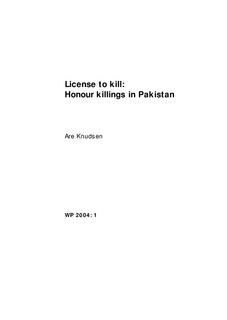License to kill: Honour killings in Pakistan
Working paper
Permanent lenke
http://hdl.handle.net/11250/2435896Utgivelsesdato
2004Metadata
Vis full innførselSamlinger
- Bora-import [434]
Sammendrag
Pakistan has one of the highest incidences of honour killings in the world. This is a major human rights issue that has received little attention outside of human rights groups and women activist networks. This paper provides a critical reassessment of honour killings in Pakistan and argues that the prevalence of honour killings is due to the fact that traditional justice prevails over jural law. Since the late 1970s, aspects of traditional justice have been incorporated in the Pakistan Penal Code, thereby sanctioning homicide of men and women charged with adultery and fornication. In order to analyse the tenuous relationship between jural law and traditional justice, this paper is based on first-hand accounts of honour killings in the North- West Frontier Province (NWFP). This actor-oriented approach shows why traditional justice sanctions honour killings and the inability of jural law and the judiciary to punish offenders. In order to deter honour killings, more strident punishment of offenders is advised to invalidate traditional justice and counteract the private use of violence.
Utgiver
Chr. Michelsen InstituteSerie
CMI Working paperWP 2004: 1
